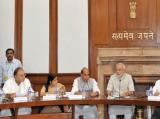New Delhi, Jan 6: The Union Cabinet on Monday approved the largest-ever telecom spectrum auction, which is likely to add at least Rs 64,840 crore to the government's kitty.

The Cabinet gave its approval to sell 380.75 megahertz (MHz) of second-generation (2G) spectrum in three bands—the premium 900 MHz, 1,800 MHz and 800 MHz. Spectrum in 2,100 MHz may also be put on auction simultaneously after the Defence Ministry vacates it.
The Cabinet, chaired by Prime Minister Narendra Modi, approved a reserve price of Rs 3,646 crore pan-India per MHz in the 800-MHz band; Rs 3,980 crore for the 900-MHz band pan-India, excluding Delhi, Mumbai, Kolkata and J&K; and Rs 2,191 crore pan-India (excluding Maharashtra and West Bengal) in the 1,800-MHz band,” said an official statement here. The auction will start on February 23.
However, reserve price for the 2,100-MHz band was not announced. 2,100-MHz auction later
Telecom Minister Ravishankar Prasad said that the government intended to auction third-generation (3G) spectrum in the 2,100-MHz band simultaneously.
The reserve or auction-start price approved by the Cabinet is the same as the one recommended by the Telecom Commission, except in the case of 900 MHz.
The commission had proposed a reserve price of Rs 3,695 crore for each MHz in the 900-MHz band, but the Cabinet has approved a reserve price of Rs 3,980 crore.
“The estimated revenues from this auction are Rs 64,840 crore (excluding the 2,100-MHz spectrum), of which Rs 16,000 crore is expected to be realised in the current financial year,” said the statement.
The government hopes that proceeds from this year's auction will help it reach its fiscal deficit target of 4.1 per cent of the GDP.
The government had garnered about Rs 62,162 crore from the previous auction in February 2014.







Comments
Add new comment